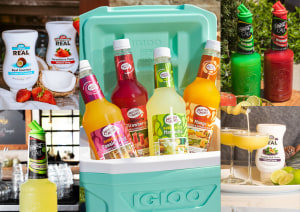At the Retail Engagement Hub on the Matthews Stand, Greg Calvert, co-founder of FreshChain Systems, spoke on how 2D barcodes can support industry on meeting regulatory requirements for labelling.
He began by clarifying the purpose of regulatory bodies, which is ensuring that individuals, businesses and organisations comply with relevant laws and compliance standards. They create a regulatory framework that “fosters economic efficiency, innovation and growth, while maintaining appropriate levels of oversight”.
"The main benefit of 2D barcodes in supporting this is the fact that it digitises data exchange, allowing you to enter the data once, but share it hundreds of times,” he said.
One example he gave of what this looks like is the new EU wine labelling regulation and what they have allowed to be used in a 2D barcode. Calvert said that with the amount of information required on the labels, that fills up “valuable real estate” on the limited space a label offers. So, a QR code enables a producer to offer all the necessary information for the consumer, such as nutrition, energy, ingredients, etc. While outside the EU, a QR code can be used for other elements, such as consumer engagement, which is not allowed under EU regulations.
The advantage of 2D barcodes in this instance is that you can use the same code on the label, and it will display differently according to the compliance regulations of the region it is scanned in.
“That’s the power and importance of how 2D can support regulatory compliance, and reduce the number of labels you have to have,” he said.
“You can even update those codes in real-time. For example if you’ve still got these codes on the market, and you need to make changes, you can go into your platform and update it in real-time. You don’t need to wait for that label to run through.”





